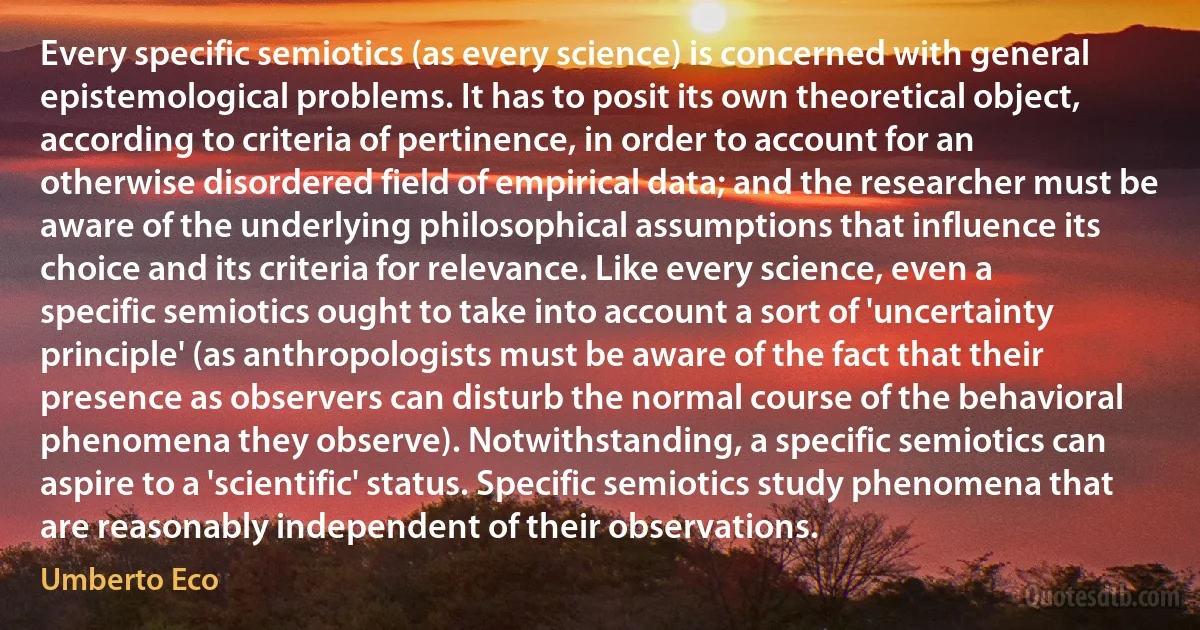
Every specific semiotics (as every science) is concerned with general epistemological problems. It has to posit its own theoretical object, according to criteria of pertinence, in order to account for an otherwise disordered field of empirical data; and the researcher must be aware of the underlying philosophical assumptions that influence its choice and its criteria for relevance. Like every science, even a specific semiotics ought to take into account a sort of 'uncertainty principle' (as anthropologists must be aware of the fact that their presence as observers can disturb the normal course of the behavioral phenomena they observe). Notwithstanding, a specific semiotics can aspire to a 'scientific' status. Specific semiotics study phenomena that are reasonably independent of their observations.
Umberto EcoRelated topics
account choice course criterion datum field general observe order ought posit presence relevance researcher science semiotics sort specific study takeRelated quotes
Around late 1961 to 1962, right around there, somewhat unevenly and sort of spottily, I began to do pieces that were based upon a short text of actions that only involved a handful of friends or students at some specific site - a site that was not marked as an art site, a ravine somewhere, or a roadway, or somebody's apartment, or the telephone, that is, the places of everyday life, not designated as sites of art. And the work itself, the action, the kind of participation, was as remote from anything artistic as the site was.. ..I chose the word Happening from its normal language usage somewhat earlier for that philosophical reason, but I didn't categorize that as lifelike until much later. But in fact, looking back, that's exactly what Happening meant.

Allan Kaprow
It is customary to define psychiatry as a medical specialty concerned with the study, diagnosis and treatment of mental illnesses. This is a worthless and misleading definition. Mental illness is a myth. Psychiatrists are not concerned with mental illnesses and their treatments. In actual practice they deal with personal, social and ethical problems in living.
I have argued that, today, the notion of a person "having a mental illness" is scientifically crippling. It provides professional assent to a popular rationalization - namely that problems in living experienced and expressed in terms of so-called psychiatric symptoms are basically similar to bodily diseases.
Moreover, the concept of mental illness also undermines the principle of personal responsibility, the ground on which all free political institutions rest.

Thomas Szasz
At the present we have no adequate scientific method for representing the psychological life span. In accord with the general methods of psychology, the study of environmental influences began with classification and statistics... they gave us excellent descriptions of the home environment. The method of representation is partly akin to that of the novelist i. e., one trying to make as lifelike picture of the situation as possible by choosing expressive words and bringing out significant traits with examples. In general, the descriptions that have been made valuable to science have not been those made by scientific methods. Where theoretical concepts have been introduced with the concrete description, they often stand out as something alien. In stead of scientific descriptions they are nothing more than speculative interpretation.

Kurt Lewin
In the absence of social awareness and appreciation of the scientific objectivity among sufficiently large number of civil servants or political leaders, the need of validity has not yet been accepted in the official tatistical system in India. Ofcial statistics in India is treated as an integral part of the dministrative system which is regulated by the principle of authority. Approval of statistical estimates at a high level of authority is accepted as a bstitnte for validity in many ases there is continuing opposition to independent cross-hccks for the validity of the data. Officials have the feeling that two independent estimates, which might differ would be confusing and, in fact unthinkable; therefore independent cross-checks in statistics should be eliminated.

Prasanta Chandra Mahalanobis
For want of the apparatus of propositional functions, many logicians have been driven to the conclusion that there are unreal objects. It is argued, e.g., by Meinong, that we can speak about "the golden mountain," "the round square," and so on; we can make true propositions of which these are the subjects; hence they must have some kind of logical being, since otherwise the propositions in which they occur would be meaningless. In such theories, it seems to me, there is a failure of that feeling for reality which ought to be preserved even in the most abstract studies. Logic, I should maintain, must no more admit a unicorn than zoology can; for logic is concerned with the real world just as truly as zoology, though with its more abstract and general features.

Bertrand Russell
